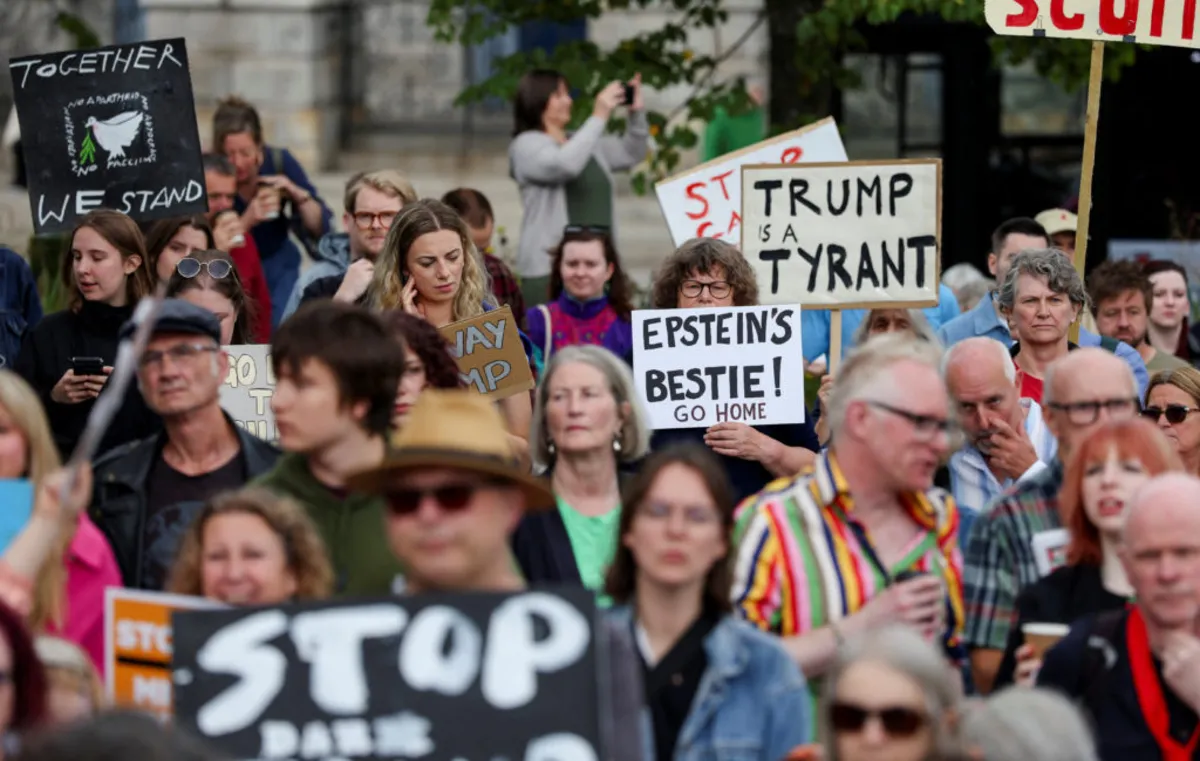
On Saturday, President Donald Trump engaged in a round of golf at his course located on Scotland’s picturesque coast. This visit coincided with widespread protests across the United Kingdom, where demonstrators expressed their discontent with his presence, accusing local leaders of catering to the American president. The visit was part of Trump's efforts to inaugurate a new golf course associated with his family business in Aberdeenshire.
During his time in Scotland, Trump was accompanied by his son Eric Trump and U.S. Ambassador to the UK, Warren Stephens, as they played at the historic Turnberry golf course, which the Trump family took over in 2014. Security measures were notably strict, keeping protesters at a distance, although they remained largely unseen during Trump's golfing activities. Dressed in black with a white "USA" cap, Trump was seen driving a golf cart and playing through the course.
The president appeared to complete nine holes, take a break for lunch, and then return for another nine holes. By the afternoon, plainclothes security personnel began to depart, indicating that Trump’s golfing session had concluded for the day.
Meanwhile, hundreds of demonstrators gathered outside the U.S. Consulate in Edinburgh, approximately 100 miles (160 kilometers) from Turnberry. Protest speakers expressed that Trump was unwelcome in Scotland, criticizing British Prime Minister Keir Starmer for recently striking a trade deal aimed at avoiding U.S. tariffs on goods imported from the U.K. Protests were organized in various cities, uniting environmental activists, opponents of Israel’s actions in Gaza, and pro-Ukraine supporters under the banner of a "Stop Trump Coalition." Organizer Anita Bhadani described the protests as “a carnival of resistance.”
Among the demonstrators was June Osbourne, a 52-year-old photographer from Edinburgh, who donned a red cloak and white hood reminiscent of “The Handmaid’s Tale.” Holding a picture of Trump with the word “Resist” emblazoned across it, Osbourne expressed her belief that many nations feel pressured to accommodate Trump, asserting, “We should not accept him here.” She referred to Trump as “the worst thing that has happened to the world” in recent decades.
Fifteen-year-old Amy White, also from Edinburgh, participated in the protests with her family. She held a sign declaring, “We don’t negotiate with fascists.” According to White, “So many people here loathe him. We’re not divided by religion, or race or political allegiance; we’re just here together because we hate him.”
Others among the crowd carried signs linking Trump to controversial figures like Jeffrey Epstein, reflecting ongoing frustrations with the president's past associations. Mark Gorman, a 63-year-old advertising professional from Edinburgh, articulated a common sentiment among the protesters, stating, “Even though he has Scottish roots, he’s a disgrace.” Gorman's presence at the protest was fueled by his disdain for everything Trump represents.
The protests on Saturday were not as large as those witnessed during Trump's initial visit to Turnberry in 2018. Nevertheless, the atmosphere was charged, with bagpipes playing and chants of “Trump Out!” ringing through the air. Demonstrators held up homemade signs reading “No red carpet for dictators,” “We don’t want you here,” and “Stop Trump. Migrants welcome.” A particularly humorous sign was seen attached to a dog, stating “No treats for tyrants.”
While some far-right individuals took to social media to organize gatherings in support of Trump in cities like Glasgow, the president’s visit was primarily centered around golf. Trump is also expected to discuss trade with Prime Minister Starmer and Ursula von der Leyen, the President of the European Commission, during his stay.
As part of his itinerary, Trump and his family plan to visit another Trump golf course near Aberdeen before returning to Washington on Tuesday. They are set to officially open a new second course in that area, which will be accessible to the public next month. Scottish First Minister John Swinney announced that public funds would support the 2025 Nexo Championship at Trump’s first course near Aberdeen, highlighting the Scottish Government's recognition of the economic benefits of golf tourism.
At a separate protest in Aberdeen, Scottish Parliament member Maggie Chapman addressed a crowd of hundreds, asserting, “We stand in solidarity, not only against Trump but against everything he and his politics stand for.” This sentiment encapsulates the widespread unease many feel regarding Trump's influence, both locally and globally.
Throughout his visit, Trump has made it clear that he cherishes his Scottish heritage, as his late mother, Mary Anne MacLeod, was born on the Isle of Lewis. However, the protests in Scotland reflect a strong local resistance to his presidency and policies.
In a social media post during his visit, Trump quoted retired golfer Gary Player, who referred to Turnberry as one of the “Top Five Greatest Golf Courses” he has played. Despite this endorsement, many locals remain steadfast in their opposition to his presence in their country.